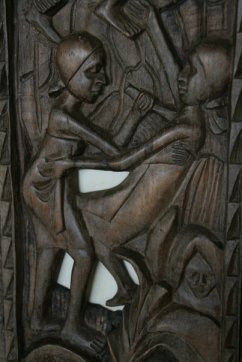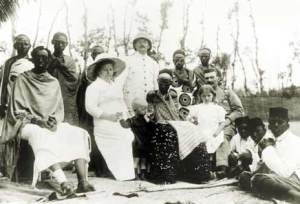Nationalized Commemoration
Wood carving at Murambi Genocide Memorial Centre. Photo by Erin Jessee.
Commemorative events and sites are generally regarded as an essential part of the transitional justice toolkit to be applied in the aftermath of genocide, war and other periods of mass violence. As stated on the International Center for Transitional Justice (ICTJ) website, “victims of human rights abuses cannot forget, and states have a duty to preserve the memory of such crimes.” But when states take control of commemoration events and sites of remembrance, what is being preserved? And to what end? Theorists warn that just as memorialization as a process can promote social reconstruction, it can also “crystallize a sense of victimization, injustice, discrimination, and the desire for revenge” (Barsalou and Baxter, 1).
On Tuesday’s class, we’ll consider processes related to nationalized commemoration, whereby transitional and post-conflict governments – often with the support of the international community – facilitate the creation and maintenance of memorial sites and events that are intended to make public the range of atrocities endured by the population. Judy Barsalou and Victoria Baxter’s report on “The Urge to Remember: The Role of Memorials in Social Reconstruction and Transitional Justice” articulates the often-ignored challenges inherent in commemorative practices in the aftermath of mass atrocities. Rachel Ibreck’s journal article “The Politics of Mourning: Survivor Contributions to Memorials in Post-Genocide Rwanda” examines the varied ways that survivors of the 1994 Rwandan genocide have contributed to the process of nationalized commemoration.
In addition, if you have the time, I’d highly recommend watching Chimamanda Adiche’s Ted Talk ” The Danger of a Single Story,” and browse through the online resource: Genocide Archive Rwanda.



